The Best 10 Enterprise SEO Tools & Platforms 2024
Estimated reading time: 7 minutes

Enterprises often handle a lot of websites in many regions and languages, each with thousands of pages. Large and complex website architectures require tailored SEO tools.
With the right SEO tool stack, large companies can focus on organic growth.
In this article we bring you the best enterprise SEO tools to exponentially grow your organic traffic.
🔍 See how we are accelerating SEO with our Scalable SEO Content Tool
Enterprise SEO Tools for fast organic growth
SEO Enterprise tools are specifically built to address fast growth. Enterprise SEO tools fall into several categories, each serving a unique purpose in the SEO strategy:
- Scalable SEO Content Creation tools: which allow websites to increase exponentially their organic visibility by deploying thousands of pages in seconds.
- Keyword Research Tools: identifying valuable keywords and providing data on search volume, competition, and trends.
- Technical SEO Tools: analyzing website health, including site speed, security, and mobile optimization.
- On-Page SEO Tools: assisting in optimization for the content on the pages, including metadata, images, and text formatting.
- Off-Page SEO Tools: supporting strategies for building backlinks and online reputation.
- Local SEO Tools: managing local listings and optimizing for local search environments.
What Are Enterprise SEO Tools?
An enterprise SEO tool is a software designed to work with large amounts of data and still deliver high performance results for organic growth.
Established online retail brands with large eCommerce websites are a great example of organizations that need enterprise SEO tools to increase their visibility on Google.
Enterprise SEO tools’ best advantage is that they can grow with the business. This is crucial for large companies because they have to keep an eye on countless pages, keywords, and online marketing efforts all at once. Not all SEO tools can cope with growth.
Top 10 Enterprise SEO Tools
Verbolia
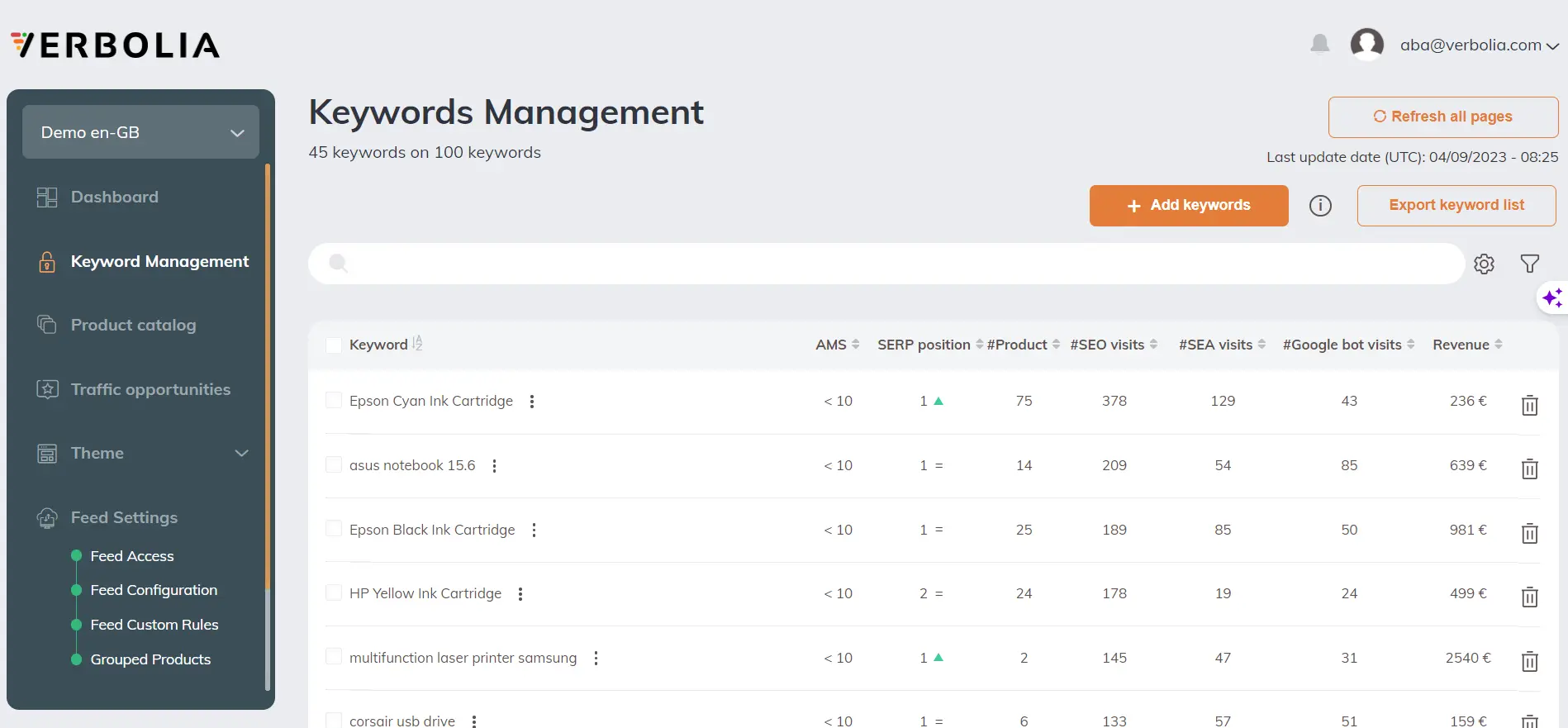
Best SEO Use Case:
It allows online retailers (eCommerce website) to grow their organic traffic at least 30%. This is achieved by a unique technology that allows publishing thousands of pages within seconds. Verbolia is the perfect definition of scalable SEO content.
Features:
Automated generation of optimized category pages for SEO, keyword opportunities finder, product recommendations.
Clients:
Large retail brands with a wide catalog (+3000 SKUs) that want to increase their organic traffic without heavy technical upgrades or implementations.
Current clients among others are Walmart.com, Decathlon.com, Boohoo.com.
SE Ranking
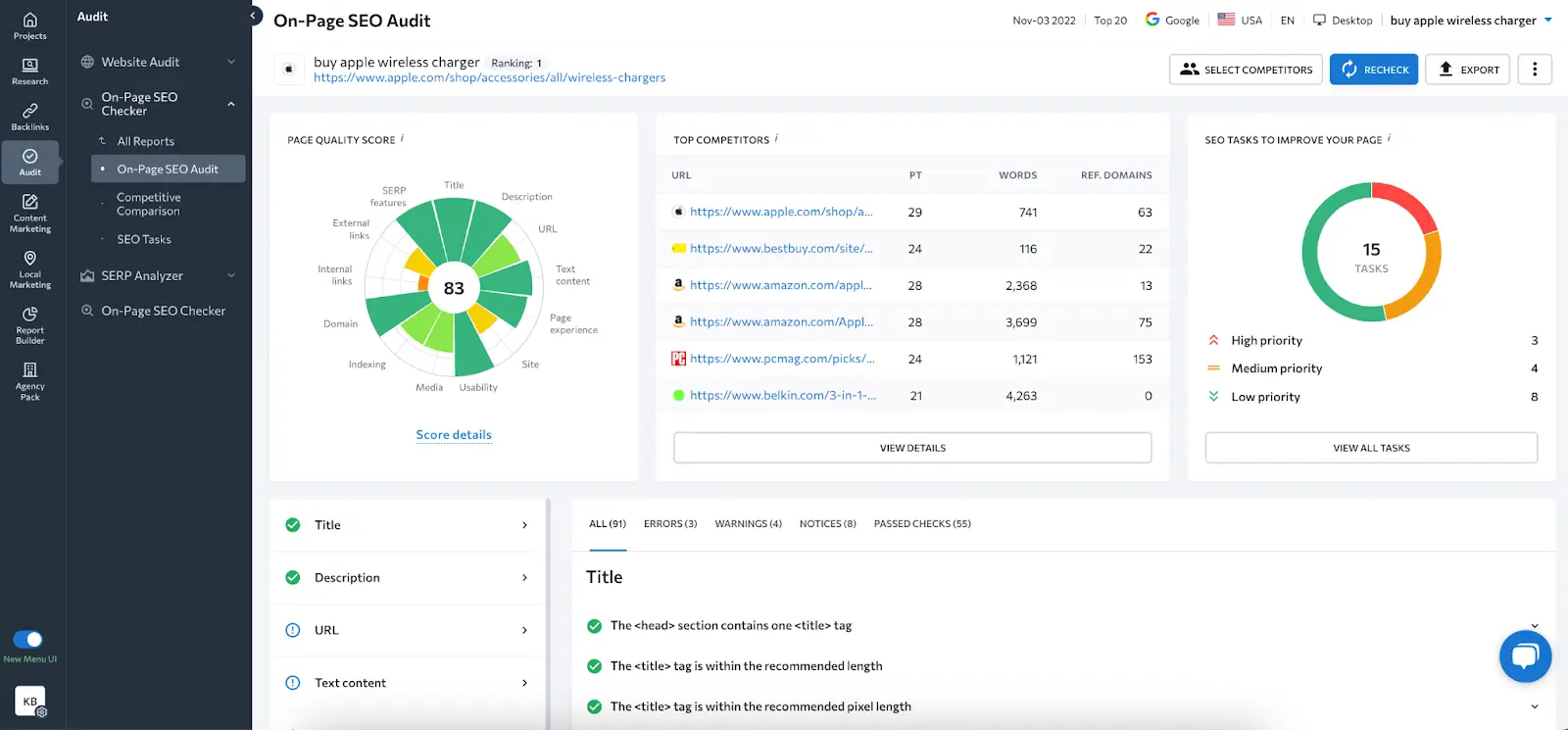
Best SEO Use Case:
SE Ranking is a reliable SEO toolset with a wide range of premium-quality tools for different company sizes, including enterprises. It helps SEO professionals manage multiple projects, track rankings accurately, optimize websites, automate reporting, and manage huge datasets with API.
Features:
Rank tracking, keyword and competitive research, technical and on-page auditing, backlink checking and monitoring, content marketing, local marketing, scheduled reports, API, and other essential tools for every possible SEO task.
Clients:
Over 1 million SEO pros from small to large-scale businesses and agencies have already tried this platform. Among famous enterprise clients are Yamaha, Plarium, and Fujifilm.
Price:
Pricing plans start from $55/month. SE Ranking also offers customizable plans to its clients.
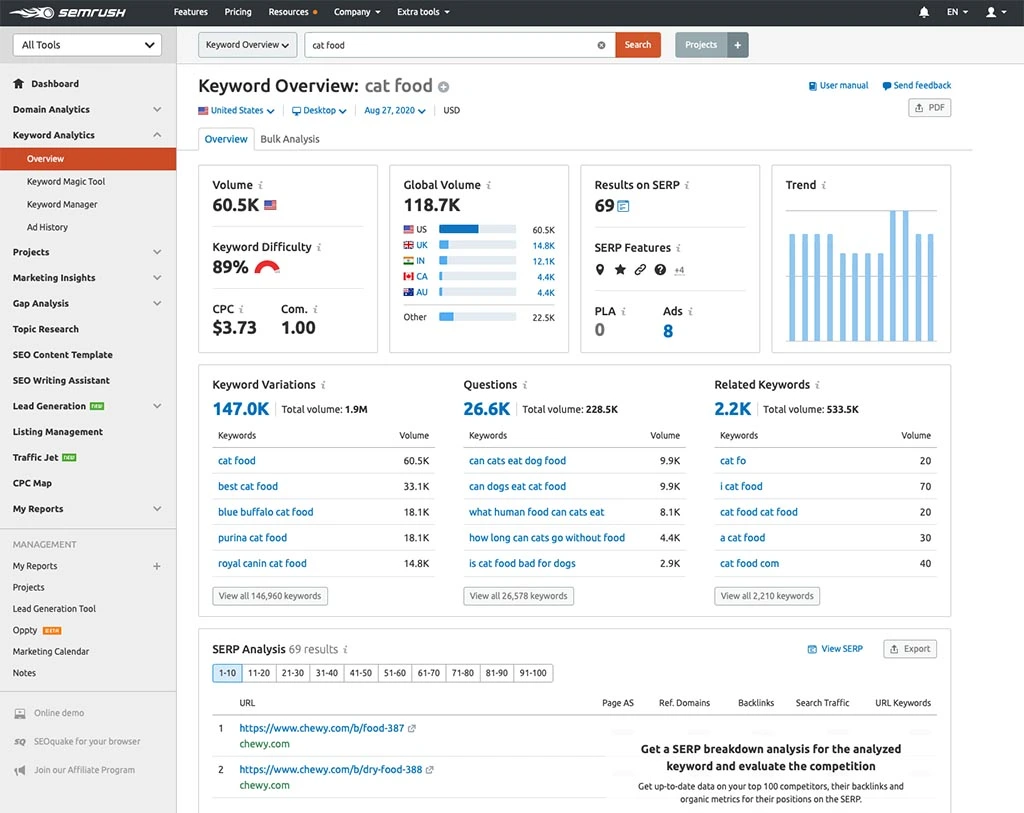
Best SEO Use Case:
Semrush is versatile, offering solutions for multiple SEO aspects from keyword research to competitive analysis, making it suitable for comprehensive SEO planning.
Features:
Keyword research, competitor analysis, site audit, backlink analysis, and ranking tracking.
Clients:
Diverse client base, from small businesses to large enterprises and agencies.
Price:
Plans starting from $129.95/month.
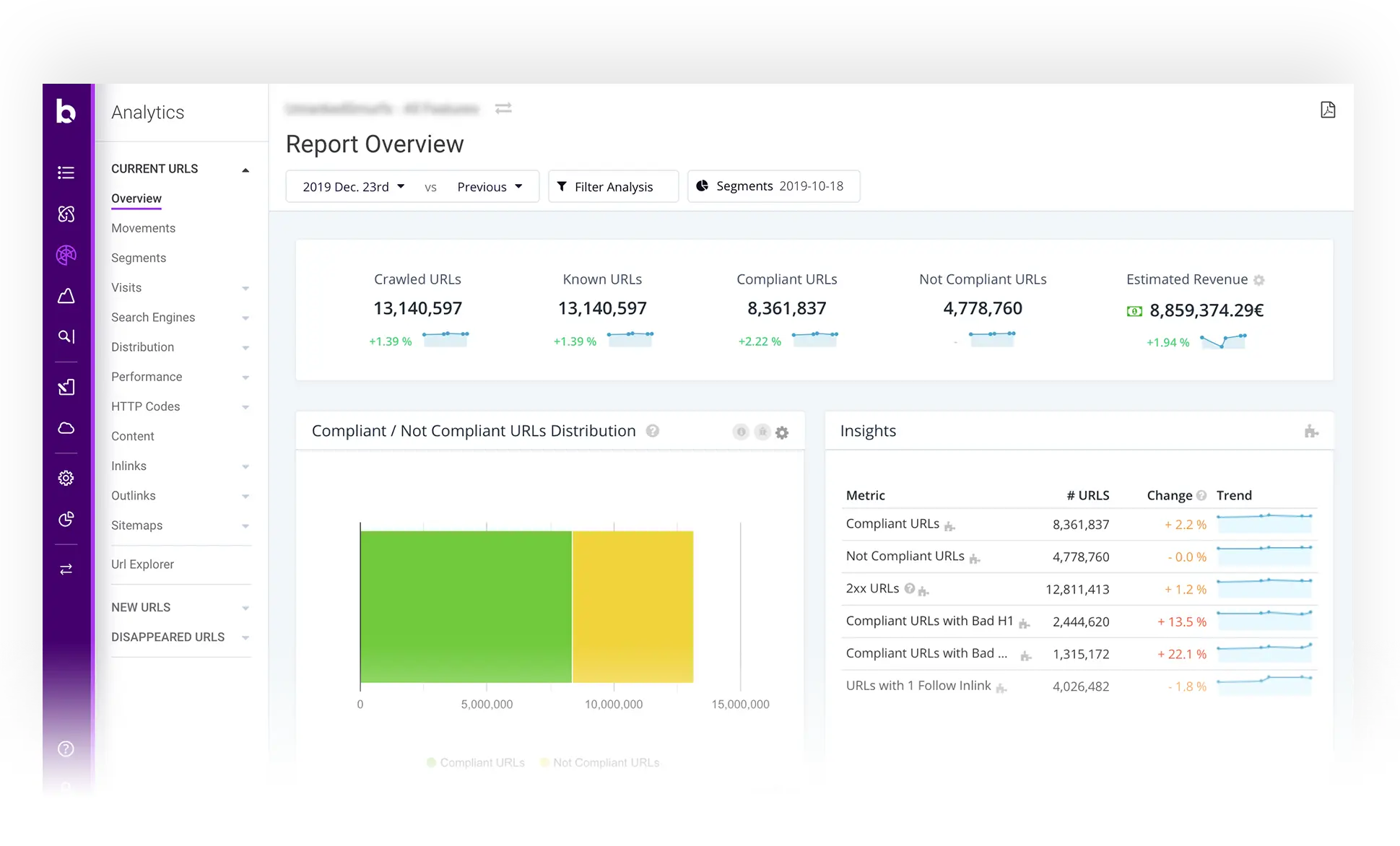
Best SEO Use Case:
Botify is designed for SEO stakeholders, streamlining collaboration between teams and emphasizing issues impacting website performance, ideal for multi-departmental coordination.
Features:
Advanced SEO crawling, log file analysis, SEO metrics dashboard, and keyword tracking.
Clients:
Suited for enterprises and e-commerce platforms requiring deep website crawls and technical insights.
Price:
Custom.
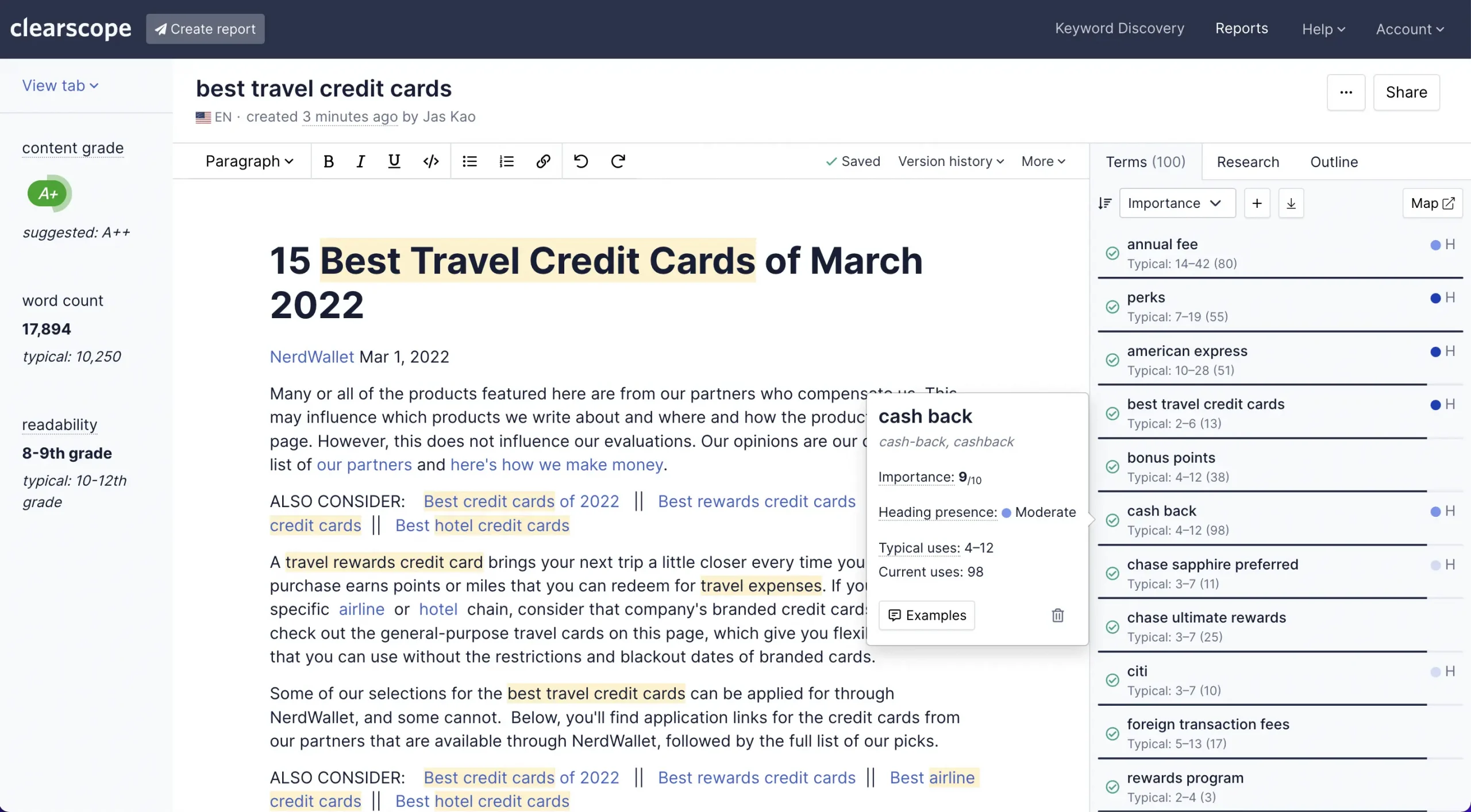
Best SEO Use Case:
ClearScope is beneficial for on-page SEO, focusing on content relevancy. It aids in refining web content to meet specific keyword criteria, enhancing relevance and readability.
Features:
AI-driven content recommendations, keyword research, content grading, and performance analytics.
Clients:
Content marketers and agencies requiring deep content analysis and optimization.
Price:
Starts at $170/month.

Best SEO Use Case:
Effective for managing large-scale SEO campaigns, with robust capabilities in deep analytics and data consolidation. It simplifies global ranking analysis for strategic content positioning.
Features:
Includes keyword research, rankings, on-page SEO analysis, competitor insights, and reporting.
Clients:
Brands demanding extensive SEO analysis across various departments and regions.
Price:
Custom (Based on specific client needs and modules required).
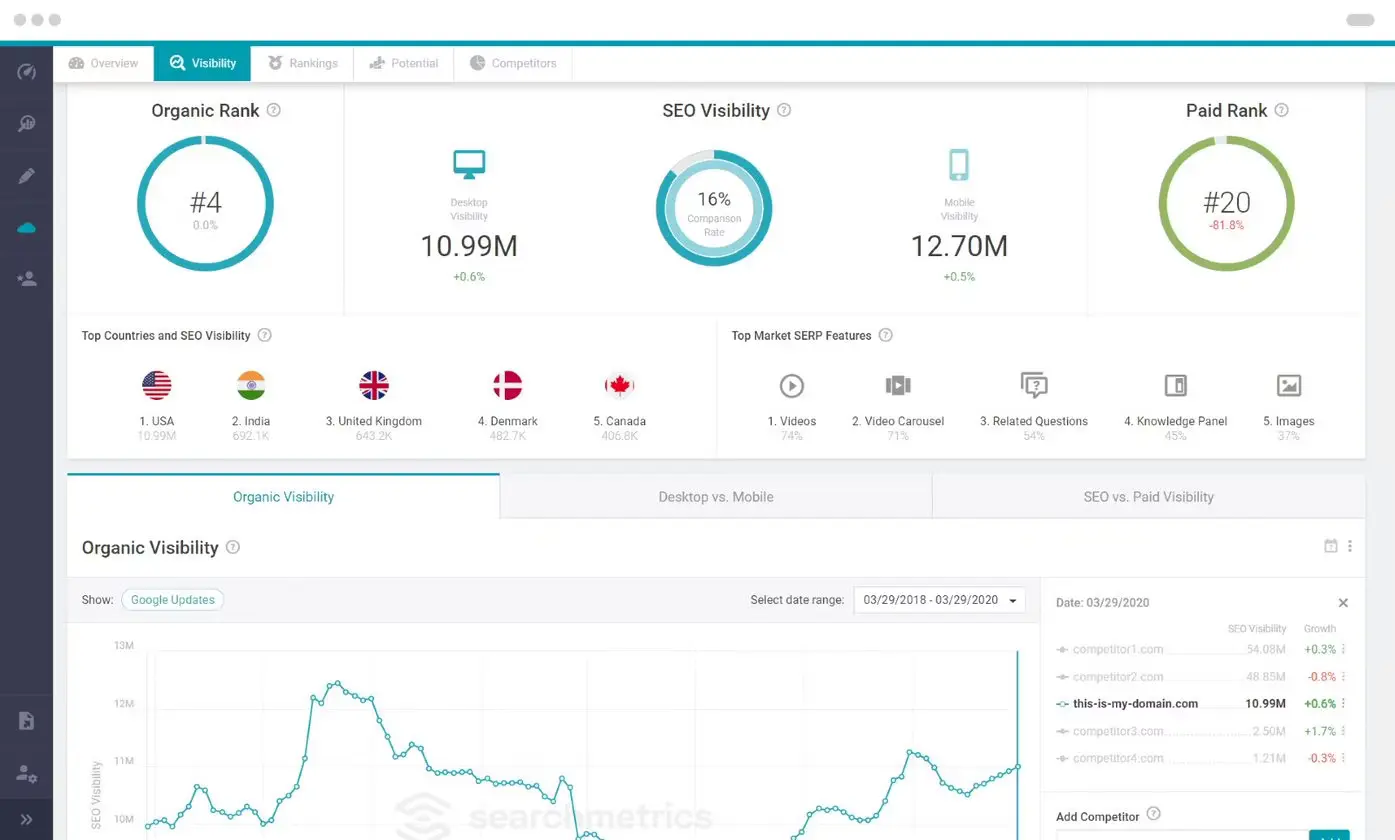
Best SEO Use Case:
SearchMetrics is proficient in competitive analysis and market insight, providing a comprehensive understanding of competitors’ strategies and highlighting opportunities for your own.
Features:
Content creation and optimization, backlink tracking, mobile SEO, social media analysis.
Clients:
Marketers and agencies seeking extensive SEO analytics and content alignment with SEO.
Price:
Custom.
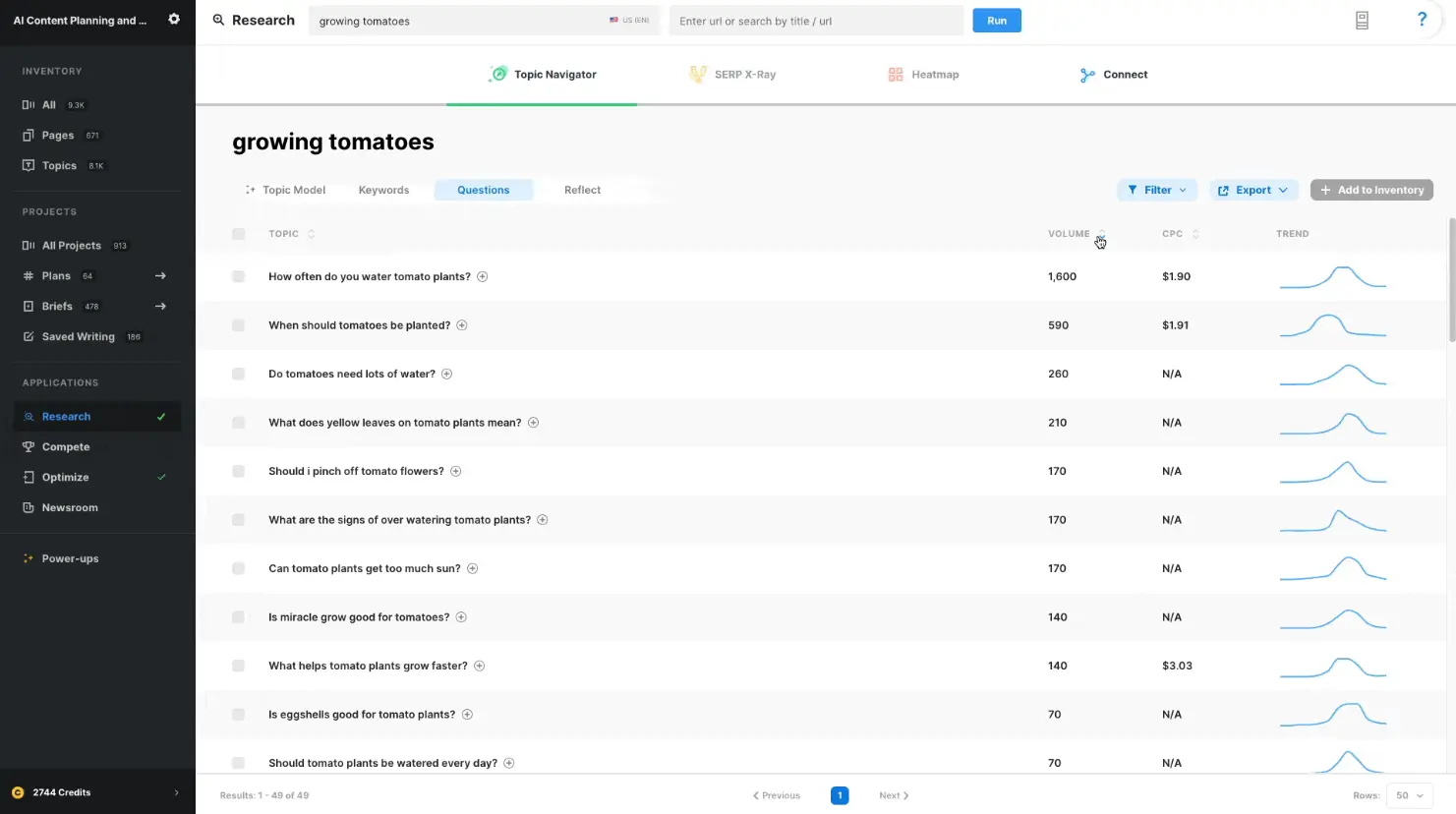
Best SEO Use Case:
MarketMuse is valuable for content optimization, employing AI to recommend content enhancements and identify gaps, assisting in the development of content that both engages the audience and performs well in search rankings.
Features:
AI-driven content research and planning, content optimization, competitive analysis, and content value tracking.
Clients:
Content-heavy enterprises and agencies focusing on strategic content planning.
Price:
Custom.
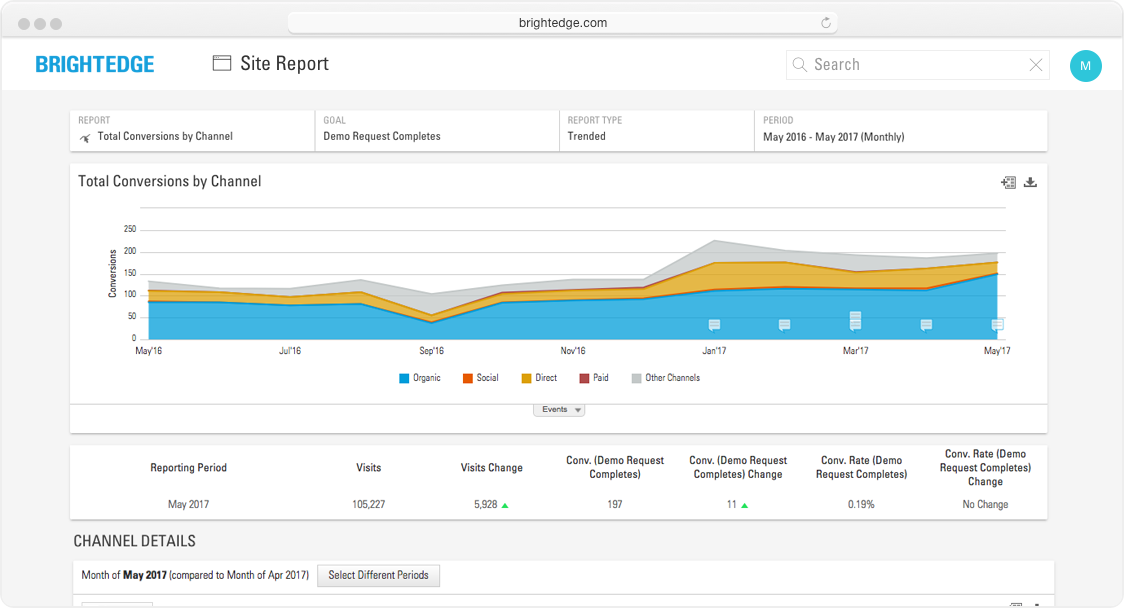
Best SEO Use Case:
BrightEdge is advantageous for its real-time tracking and insights, useful in monitoring immediate changes in search rankings and quick adjustments in strategies.
Features:
SEO management, content performance marketing, SEO recommendations, and reporting.
Clients:
Large enterprises requiring integrated solutions for SEO with wider digital marketing efforts.
Price:
Custom.
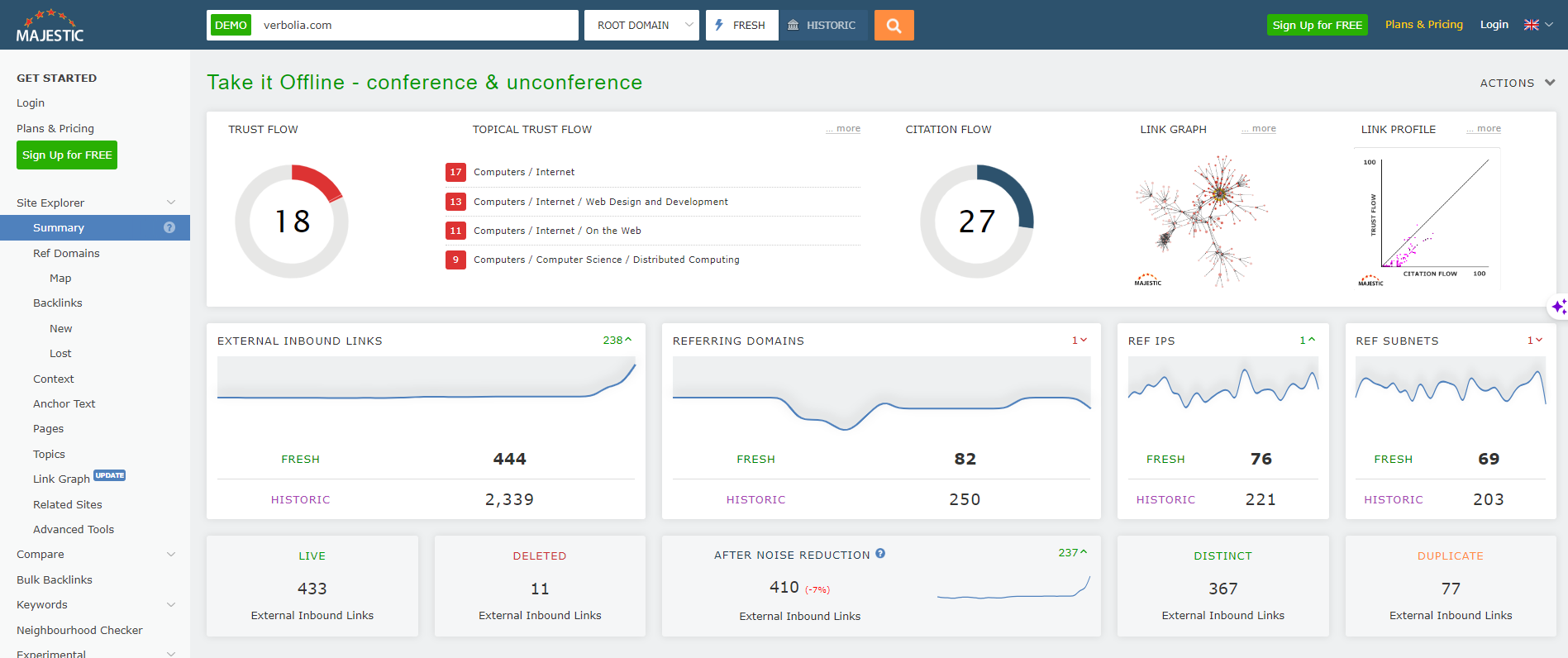
Best SEO Use Case:
Majestic specializes in backlink analysis, offering extensive link data and helping in the cultivation of a strong, effective link building strategy.
Features:
Comprehensive backlink analysis, link building strategies, domain comparison.
Clients:
Businesses focusing on off-page SEO, particularly in building a robust backlink profile.
Price:
Plans range from $49.99/month to custom pricing.
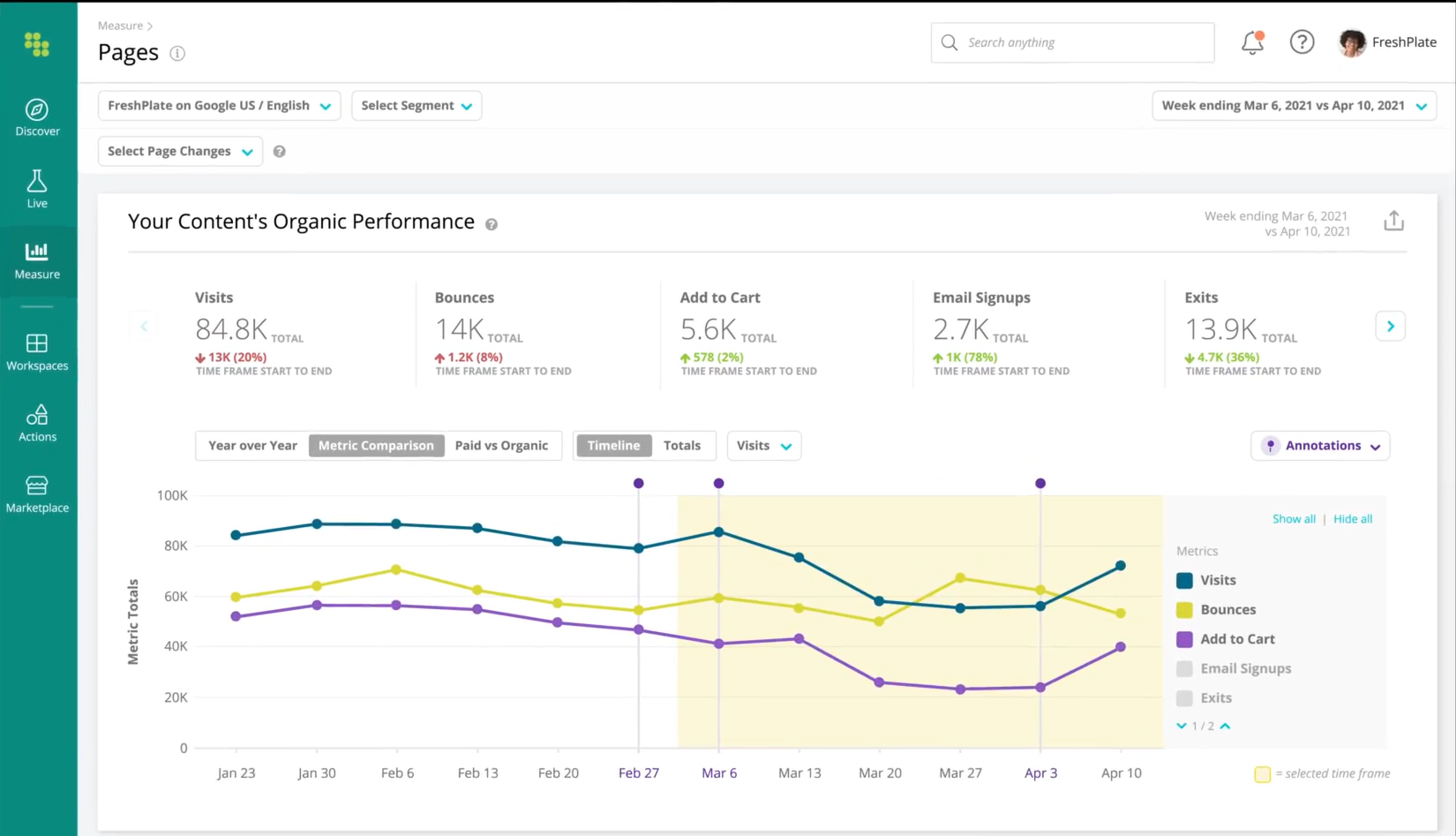
Best SEO Use Case:
Conductor is notable for improving organic online presence. Its customer voice feature garners essential insights into audience preferences, guiding more precise content strategies.
Features:
Audience intent analysis, content performance tracking, competitor analysis, and strategic insights.
Clients:
Suitable for large-scale content marketers and SEO-focused agencies.
Price:
Custom.
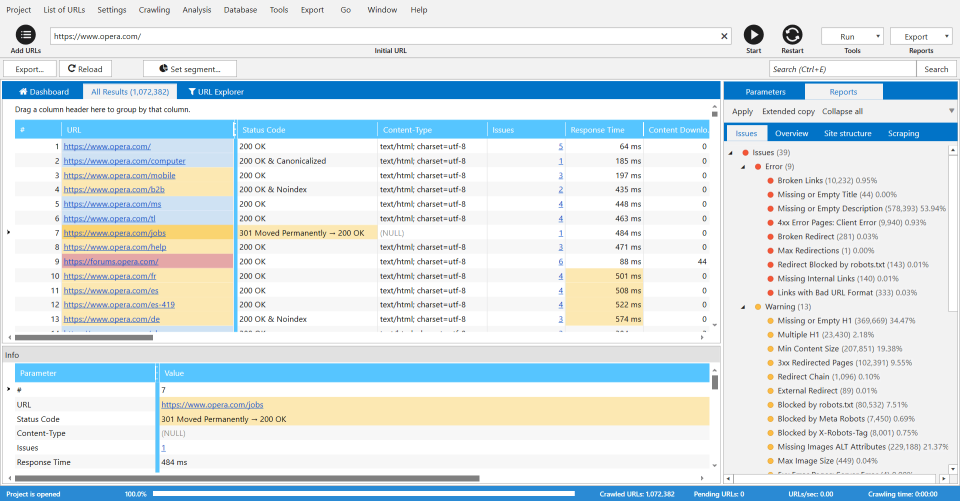
Best SEO Use Case:
The go-to for technical SEO audits, capable of quickly identifying site errors, redirects, and blocked URLs, making it essential for website health checks.
Features:
SEO spider tool, site crawl, technical SEO audits, duplicate content detection, and site visualization.
Clients:
SEO agencies and businesses with a need for thorough technical website analysis.
Price:
Starts at $7/month.
Bonus Tool: Ahrefs
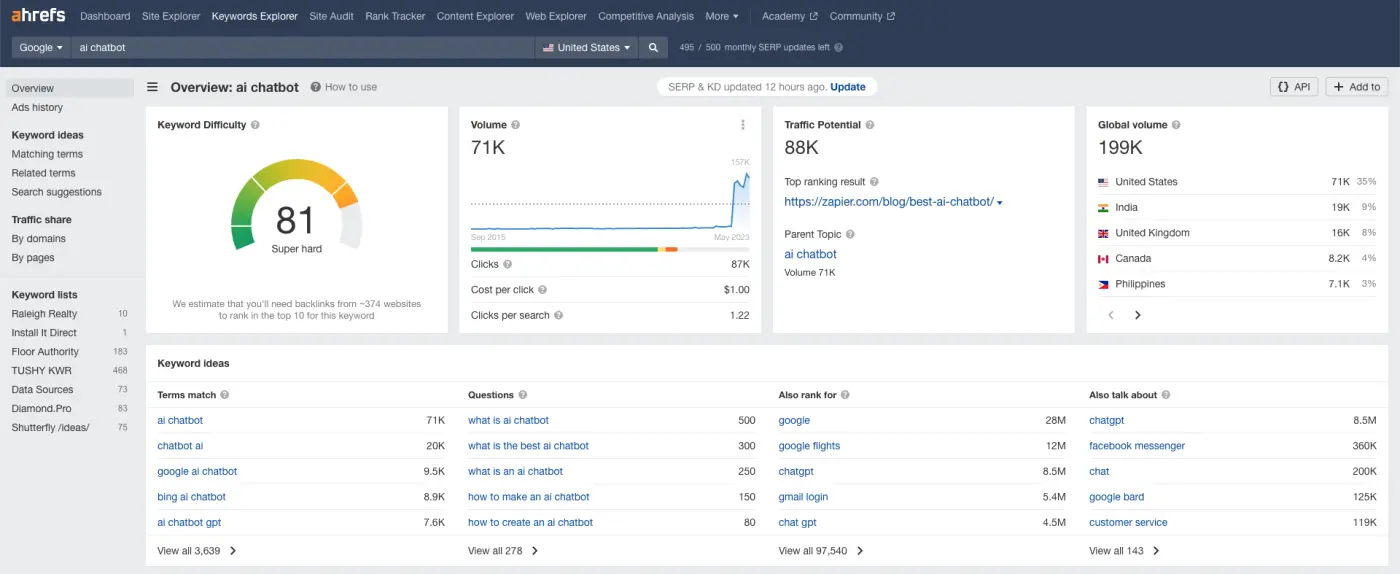
Best SEO Use Case:
Ahrefs excels in providing a detailed keyword, content, and backlink research, facilitating a more informed approach to SEO strategies.
Features:
Backlink monitoring, competitor analysis, keyword research, rank tracking, web monitoring.
Clients:
Suited for small to large businesses, SEO professionals, and digital marketers focused on link-building campaigns and competitive SEO strategies.
Price:
Plans starting from $89/month.
Enterprise SEO Software with Verbolia: Scalable SEO Content
At Verbolia, we specialize in optimizing long-tail visibility for large ecommerce websites. By analyzing your product catalog, Verbolia automatically identifies keywords for which you can improve SERP rankings by producing dedicated category pages.
The pages are seamlessly integrated on your domain with a reverse proxy and linked into your site’s structure with an intelligent widget, so search engines can find them.
What is its real effect? Let’s look at case studies of different businesses.
Verbolia customers typically experience a 30% uptick in organic traffic over a 9 to 12-month period post-implementation. Here are some examples:
Scalable Content for Fashion Industry – Case study
US-based fashion brand – medium brand authority (70K monthly brand searches) – 5.300 category pages created
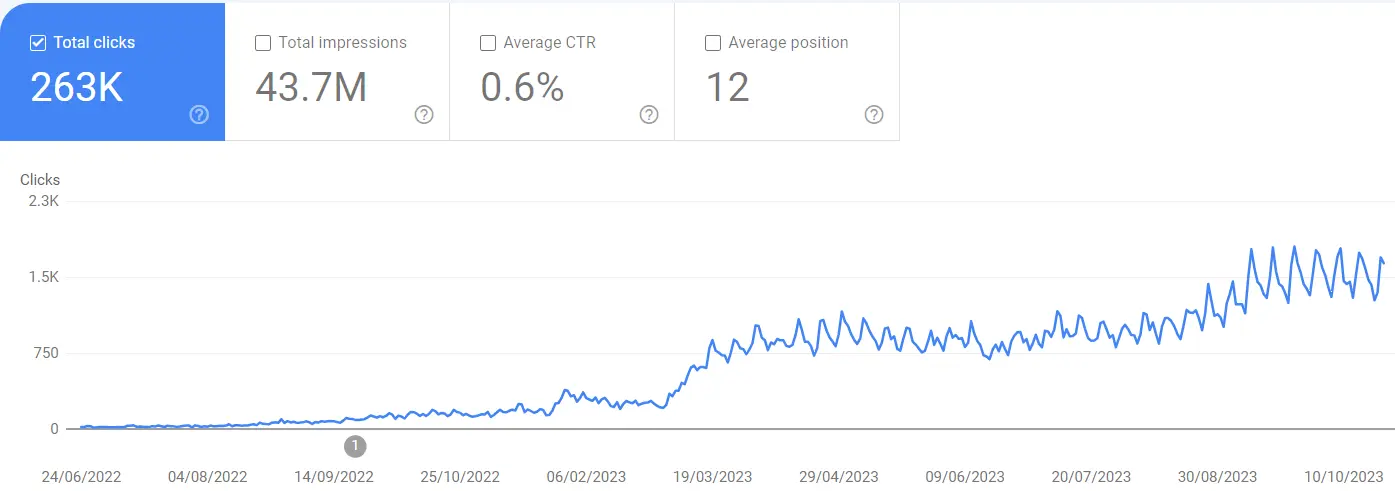
Scalable Content for Retail industry – Case study
European retailer – high brand authority (900K monthly brand searches) – 11.000 category pages created
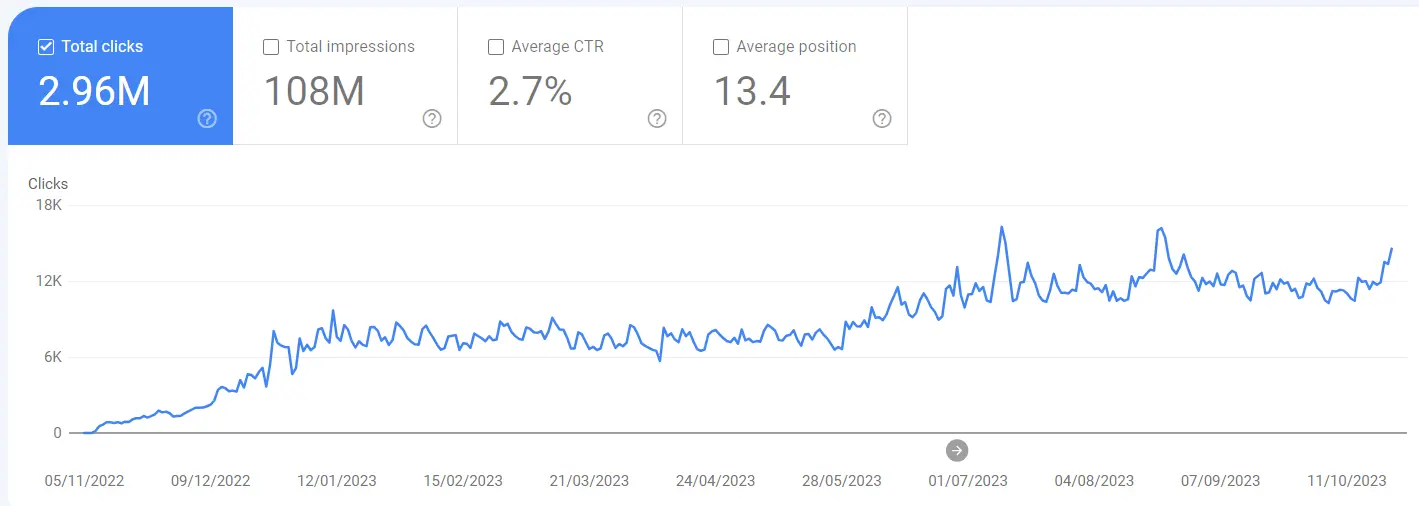
Scalable Content for Wholesale and Retail industry – Case study
European provider – medium brand authority (40K monthly brand searches) – 3.000 category pages created
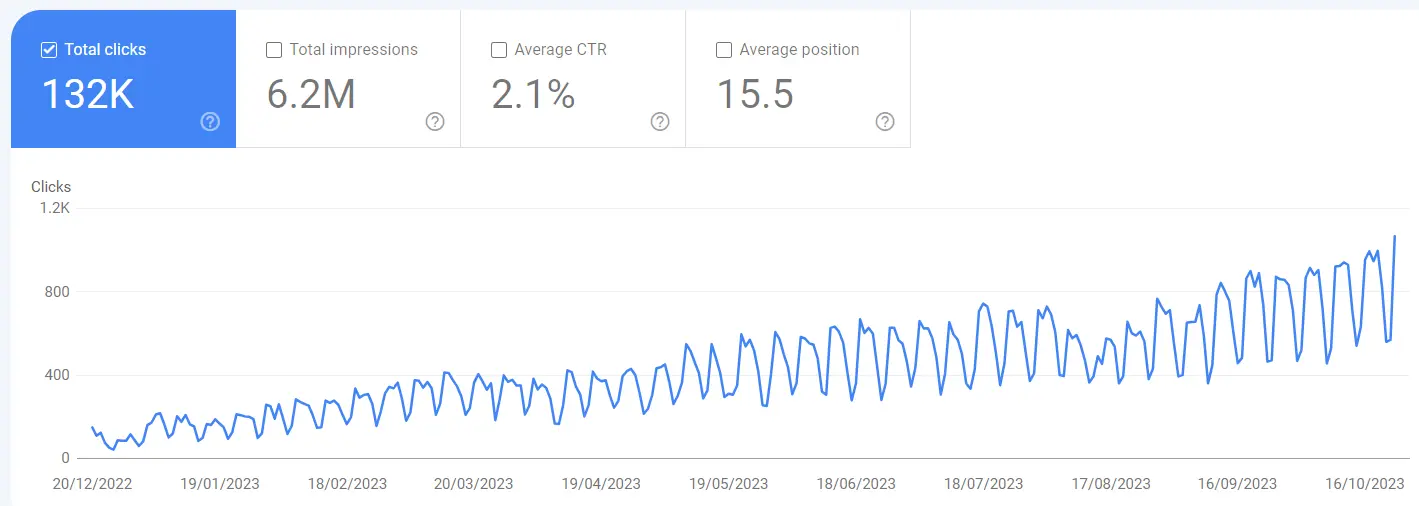
Embracing Content Scalability with Verbolia
Verbolia’s solution embodies the essence of scalability. By automating the generation of SEO-optimized category pages, Verbolia enables big e-commerce websites to get broad, effective SEO without manually creating each page. This approach not only captures the ‘long-tail’ SEO opportunities but also adapts to your adapting offer and the evolving market demand, thanks to its intelligent, automated learning capabilities.
By integrating solutions like Verbolia, businesses can substantially amplify their content’s reach, adapt to market trends and user behaviors, and solidify their domain authority — all while making efficient use of resources. In the world of e-commerce SEO, scalability isn’t just beneficial; it’s a necessity for sustainable growth and to keep up with competition.
Programmatic SEO is the future of scalable Digital Presence
The landscape of e-commerce marketing is undergoing a significant transformation with programmatic SEO, a change that has gained momentum over the past year due to breakthroughs in AI technology. Now, expanding your online store has become an automated process. This revolution isn’t just about speed; it’s about intelligent growth. AI doesn’t just create pages; it crafts them based on clear opportunities, understanding what shoppers are searching for, and ensuring your site provides the answers.
One key advancement is AI’s improved ability to comprehend search intent. It can now discern when different pages seem too similar and might compete for the same search terms. This means AI is effectively curating web content, knowing when to generate a new page and when it’s unnecessary, preventing the redundant, spam-like environment that once cluttered the digital space. Instead of indiscriminately adding pages, AI ensures that each one is purposeful and distinct, aligning with specific search queries and user needs.
This smart approach keeps you ahead in the ever-evolving trends, ensuring your online presence is expansive yet relevant. It takes away the manual burden, enabling your business to capture customers’ attention more efficiently and thrive in the bustling e-commerce universe.
How to Choose an Enterprise SEO tool?
Set up the right Enterprise SEO Strategy
Adopting an Enterprise SEO platform necessitates a strategic approach. The first step is setting up the right Enterprise SEO strategy. Companies need to identify their goals, ranging from improving site health to dominating SERPs globally. Understanding these objectives and defining your ROI expectations with SEO dictates the features SEO specialists require, such as advanced analytics, keyword optimization, or integration capabilities.
🔍 Use our tool to find organic growth opportunities for eCommerce
Compare Tools and Get Demos
Next, compare tools & get demos. Don’t take others’ words for it – try it for yourself. Demos will show their usability and performance of each SEO Tool. Ask questions based on your specific challenges to grow with SEO to see how the tool handles them. Aim to find something practical with good results.
Examine case studies on SEO
These are valuable resources for realizing the tool’s use and success in actual situations. Case studies can display how other companies have dealt with their SEO struggles as well as the part the tool played in that process. This assessment can enable you to predict the possible effects on your operations and results.
🔍 Check these SEO case studies of exponential growth
Platform Reviews and Contract Conditions
Lastly, don’t skip over platform reviews and contract details. Research customer satisfaction and product reliability from third-party sites. Be clear on the agreement, scalability, support, and extra expenses. This will prevent surprises and make the SEO tool of your choice a reliable source for your organic growth.
Remember to pick an Enterprise SEO tool that will meet your present needs and have the vision for the growth of your business and changing business situations.
Why is enterprise SEO important?
Enterprise SEO is crucial because it directly impacts a business’s visibility and scalability in the competitive online market. For large corporations, it’s not just about maintaining an online presence but optimizing that presence across various regions, languages, and, most importantly, according to the ever-evolving search engine algorithms (Google makes an average of nine changes per day). Without a robust enterprise SEO strategy, even businesses with quality offerings risk obscurity in the vast internet space.
Moreover, as enterprises expand globally, they encounter diverse market dynamics and audience behaviors. Specialized SEO tools are fundamental to understand these complexities and ensure content gets to the right people, following local search rules. This targeted strategy not only increases visibility online but drives quality traffic, making more conversions and offering higher returns.
Furthermore, enterprise-level competition requires data-driven decision-making. The insights derived from SEO tools equip businesses with critical market intelligence, from emerging trends to competitor strategies, aiding them in making informed decisions. This level of strategic planning is essential for enterprises to predict market shifts, adapt accordingly, and maintain an edge over their competition.
For businesses, especially in the e-commerce sector, increasing visibility in the search engine rankings is crucial. Discover insightful strategies to improve your eCommerce SEO rankings and stay ahead.
Key Benefits of Using Enterprise SEO Tools
Understanding the benefits these tools offer is essential to dominate your market niche. Here’s how they make a difference:
1. Content optimization:
Enterprise SEO software enhance content optimization by scrutinizing existing content, highlighting improvement areas, and identifying content gaps. They suggest new pages, optimize keyword usage, and enhance readability for user engagement. Additionally, they recommend the removal of outdated or irrelevant content, ensuring the site’s quality and relevance. These tools also adjust structural elements for full SEO compliance, monitor user engagement metrics, and guide the creation of targeted, valuable content that resonates with audiences, leading to better visibility, engagement, and conversions.
2. Technical SEO:
The technical health of your website is a crucial factor for search engine rankings because they directly impact the ability of search engine bots to access, crawl, and index the content on the site. Enterprise SEO tools conduct a thorough analysis of your site’s technical framework — from site speed to mobile-friendliness and SSL security. They identify and help rectify issues such as broken links, improper redirects, and crawling errors, ensuring search engines can index your site effectively. By streamlining these technical elements, these tools enhance the user experience, which is a key factor in search ranking algorithms.
3. Reporting and analytics
Analytics and reporting features in top enterprise SEO tools eliminate guesswork, enabling businesses to make decisions based on solid data. Through comprehensive dashboards and custom reports, businesses can measure the effectiveness of their SEO strategies. By tracking performance over time, they can see the direct results of their initiatives, helping them invest wisely in future SEO efforts. Moreover, understanding the financial impact of your SEO efforts is essential. Learn how to calculate eCommerce ROI to ensure that your strategy is yielding profitable results.
4. Long-tail SEO
Capturing long-tail keywords (longer, more specific keyword phrases) can be a game-changer in driving high-quality traffic to your site. These phrases have lower search competition and often pull in more qualified leads. Enterprise SEO platforms help find relevant long-tail opportunities for your business. They help include these phrases in your content or create optimized pages for better search visibility. This leads to more targeted traffic with increased conversion potential, usually from users close to making a purchase.
How Does Enterprise SEO Differ from Traditional SEO?
Enterprise SEO differs from traditional SEO primarily in scale, complexity, and strategic focus. While both aim for higher search rankings, enterprise SEO deals with a larger, more intricate web presence, often spanning multiple websites across different regions and languages, necessitating sophisticated tools and strategies.
Traditional SEO focuses on optimizing individual pages and is often narrower in scope, ideal for small to medium-sized businesses. In contrast, enterprise SEO demands a deeper understanding of global market variations, including regional search engine preferences and compliance, language nuances, and cultural differences in search behavior. These intricacies require enterprise-level tools that offer comprehensive insights, competitive intelligence, and predictive analytics to maintain a brand’s prominence and strategic edge globally.
How Much Do Enterprise SEO Tools Cost?
The cost of enterprise SEO platforms can vary significantly, depending on the features, scalability, and customization they offer. Prices typically start from a few hundred dollars per month and can go up to several thousand for premium packages. Get a clearer understanding of SEO costs to plan your budget effectively.
Most providers offer tiered pricing plans, allowing businesses to select a package that matches their requirements and budget constraints. These costs often reflect the tool’s ability to handle vast amounts of data, provide in-depth analytics, and integrate with other enterprise software systems.
Additionally, many vendors offer custom quotes as enterprise needs can be unique and may require more tailored solutions, including advanced security, multiple user access, and international SEO capabilities. It’s advisable to request detailed proposals and compare offerings from different vendors to understand the value and ROI before committing to a specific SEO tool.
Calculating the potential return on your investment is crucial when considering these tools. Utilize an enterprise SEO ROI calculator to help assess the cost and potential returns of different SEO solutions.
🔍 Calculate how much Verbolia can boost your e-commerce platform
FAQs
What is an enterprise SEO platform?
An enterprise SEO platforms are designed to facilitate large-scale SEO management. It’s made to handle high volumes of data and complexities associated with large websites with extensive content. These platforms offer advanced features such as global SEO management, detailed analytics, integration with existing business tools, automated reporting, and adaptive learning algorithms to improve search rankings and online visibility.
What is the difference between enterprise SEO and local SEO?
Enterprise SEO and local SEO serve different purposes. Enterprise SEO targets a broad, international audience and is ideal for large companies with complex websites offering numerous products or services. It’s about enhancing brand visibility and customer interaction on a grand scale, beyond geographical constraints.
In contrast, local SEO is perfect for smaller businesses focusing on a specific area. It emphasizes ranking in local search results, attracting nearby customers, and appearing in local directories. This approach is essential for businesses like local shops or restaurants, as it helps locals find them easily online.
Both are important: local SEO brings community-specific visibility, while enterprise SEO optimizes large-scale online presence and revenue. Each business must choose based on its size, scope, and customer base.
What are the benefits of enterprise SEO?
Enterprise SEO platforms are key for large businesses, simplifying complex needs. It boosts a company’s online presence across different branches and global markets, making sure the brand shows up in online searches everywhere. This special approach understands big businesses’ structures, helping them stand out against competitors, even in different regions or countries. It connects various parts of the business, ensuring the company’s message is clear worldwide. Enterprise SEO handles the tough work of managing big websites, creating uniform quality, safeguarding technical quality and supporting a company’s growth and customer reach on a large scale.
What is an enterprise content management system?
The best enterprise content management software systems (ECMS) serve as the backbone to manage large-scale online retail content efficiently. It organizes, stores, and retrieves product information, ensuring data consistency that enhances SEO potential. This system supports SEO strategies by ensuring product and category pages are optimized with relevant keywords, accurate descriptions, and high-quality images, boosting their rankings in search engine results. An ECMS simplifies the handling of dynamic e-commerce content, helping retailers keep up with market trends, customer preferences, and inventory updates, thereby sustaining an optimized, searchable, and competitive e-commerce platform.
About The Author
How can Verbolia help your e-commerce platform.

